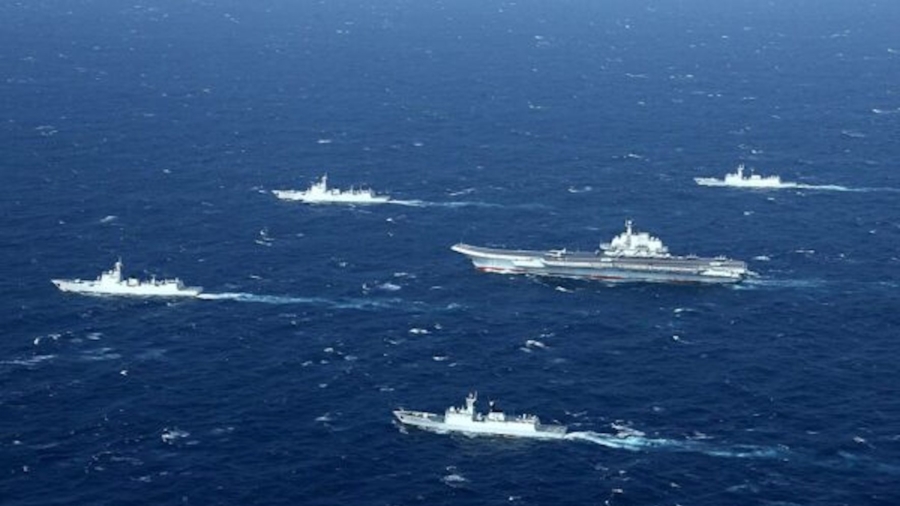Vice Adm. Michael McAllister, the U.S. Coast Guard’s top commander in the Pacific, recently said China’s new maritime reporting requirement was “very concerning” and violated “international agreements and norms.”
In fact, McAllister added, if China chose to enforce the requirement, it would “begin to build foundations for instability and potential conflicts.” He expressed his concerns during a press briefing on Sept. 3.
Foreign vessels entering what Beijing considers its “territorial waters” would be required to report their detailed information—including ship name, call sign, last and next port call, and current position—to China’s Maritime Safety Administration, according to the agency’s notice issued on Aug. 27. The reporting requirement went into effect on Sept. 1.
The requirement would apply to four different types of foreign vessels—submersibles, nuclear vessels, ships carrying radioactive materials, and ships carrying bulk oil, chemicals, liquefied gas, and other toxic and harmful substances. Other foreign ships that “may endanger China’s maritime traffic safety” would also be subject to the same requirement.
The reporting requirement was a part of China’s new Maritime Traffic Safety Law, which also went into effect on Sept. 1. The law was amended in April by the Standing Committee of China’s rubber-stamp legislature, the National People’s Congress.
Under the new law, Beijing could also force foreign vessels that “threaten the safety of the People’s Republic of China’s internal or territorial waters” to leave.

In response to China’s new maritime requirement, McAllister said the U.S. Coast Guard would continue to work with partners in the region.
“We’re in the region really in part to support key partners that are growing increasingly concerned over China’s aggressive and sometimes coercive actions, and our partners’ concerns with their lack of capability or capacity to adequately respond to those actions,” McAllister said.
China’s new maritime rules are expected to raise regional tensions. Conflicts could flare up in the disputed South China Sea, the East China Sea, and the Taiwan Strait, the three bodies of water that are frequently visited by foreign commercial and military vessels.
Beijing, which claims Taiwan as a part of its territory, considers the whole Taiwan Strait as its “internal sea,” and often accuses foreign countries that sail through the strait of violating international law.
Meanwhile, the Chinese regime has adopted aggressive tactics in an effort to stake its claims in the South China Sea, even though The Hague’s Permanent Court of Arbitration ruled in 2016 that Beijing’s territorial claims were inconsistent with the United Nations Convention on the Law of the Sea (UNCLOS).
Vietnam, one of the governments that faces a territorial dispute with Beijing in the South China Sea, called on China to respect UNCLOS, in a statement in response to China’s new maritime law.
The Pentagon and the U.S. State Department have both voiced their criticism; the former said that China’s new law would pose “a serious threat to the freedoms of the seas.”
“The United States will continue to fly, sail, and operate wherever international law allows,” the Pentagon’s Lt. Col. Martin Meiners told the Stars and Stripes, when asked about the potential impact of China’s new maritime law on U.S. Navy operations in the region.
The U.S. 7th Fleet regularly conducts freedom of navigation operations in the South China Sea and the Taiwan Strait. Recently, guided-missile destroyer USS Kidd and a U.S. Coast Guard national security cutter transited through the Taiwan Strait on Aug. 27. The U.S. Navy stated the routine transit was a sign of “U.S. commitment to a free and open Indo–Pacific.”
“China is once again testing the international community to gauge how it will react to the enactment of yet another maritime law that exceeds the permissible jurisdictional limits of international law, as reflected in UNCLOS,” stated Raul A.F. Pedrozo, professor of international law in the Stockton Center for International Law at U.S. Naval War College, in his analysis.
He predicted that Beijing would use the new maritime law to “engage in grey zone operations below the threshold of armed conflict to intimidate its neighbors and further erode the rule of law at sea in the Indo–Pacific region.”
From The Epoch Times


